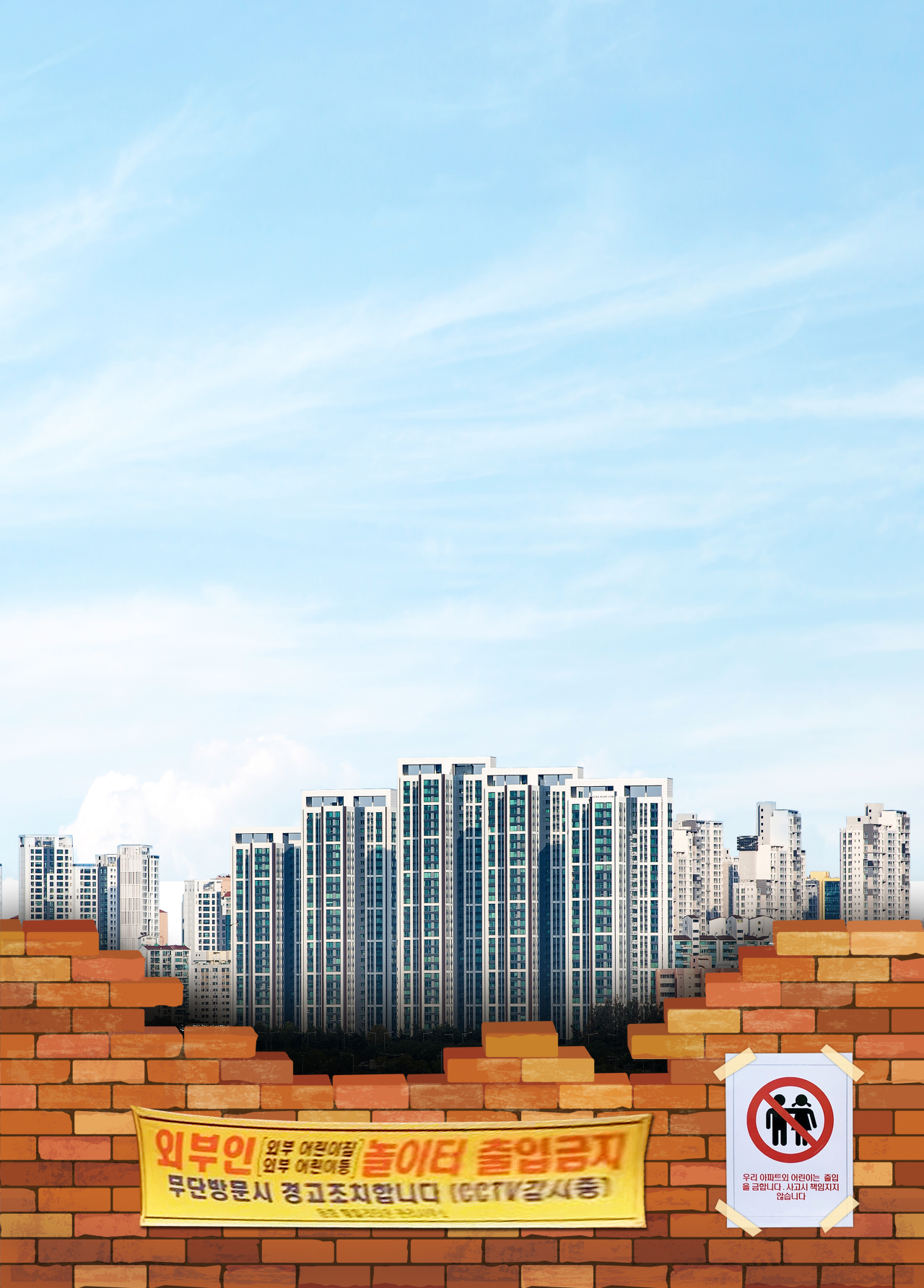[Weekender] The great gate debate
发布时间:2024-09-22 05:29:19 作者:玩站小弟  我要评论
我要评论
A vote took place at one of the most expensive apartment complexes in central Seoul last May. “Due t
。

“Due to the indiscriminate actions of passersby within the complex, damage to residents such as trash throwing, unauthorized use of facilities, theft accidents and pet excretion continues to take place,” read the notice for the vote, asking residents to express their opinion through the poll on the installation of fences and a gate to limit the access of strangers.
Of 1,148 households in Gyeonghuigung Xi’s complex 2, which was built in 2017 in Jongno-gu, Seoul, 68 percent voted in favor.
“It was unpleasant to see people from outside drinking and making noise while sitting on benches in the complex where children are playing,” said a resident who voted for the fence installation. He declined to be named.
As is the norm with new apartment complexes in Korea, Gyeonghuigung Xi is not just a flock of tall residential towers. It has stylized shared gardens between buildings, walking and biking trails, water gardens, fountains, a cafe, library, gym and other community facilities.
His family pays about 300,000 won ($242) for their apartment maintenance fees per month. It includes costs for tending those community amenities and the use of outdoor elevators, which are often harnessed by nonresidents to take a shortcut to a nearby 50-year-old traditional market.
If not a physical fence, a psychological wall exists between some residents of new apartment complexes and their neighbors.
Five children who were playing at a playground of an apartment complex in Yeongjongdo, Incheon, were held at the apartment’s management office in October last year for playing in “someone else’s playground.”
The then leader of the residents’ council reported the children to police, alleging they damaged playground facilities. It was proven to be false based on footage from the surveillance camera installed there.
According to the children’s testimony, the man singled out children who didn‘t live in the apartment complex and called them “thieves” for coming to “someone else’s playground.”
The parents of the children sued him for intimidation and confinement. He lost his position through votes of the apartment residents.
Rise of gated communities
The two cases show a growing trend of apartment complexes turning into gated communities in a country nicknamed “the republic of apartments.”
The desire to secure a safe living space for residents of the complex by blocking the noise and potential danger stemming from the outside world is particularly strong among those living in newly-built apartments that feature posh amenities and well-designed landscape.
“People living in the same compound have been developing a unique type of community fellowship in big cities, as they share the same interest -- including home prices,” said Jung Heon-mok, an anthropology professor at the Academy of Korean Studies.
To be fair, gated communities are not a new thing. In many countries with a sharp gap between the rich and poor, wealthy residents congregate in gated communities, keeping themselves apart from the rest.
Yet, in Korea, competitions between construction companies to build prestigious and private apartments equipped with state of the art technology security systems, gardens and community centers have initiated the trend, experts said.
“A gated community may be needed to ensure security and safety in suburban areas, but the creation of a closed environment and complex in city areas has a negative impact on the existing urban ecosystem,” said Kim Do-nyun, an architecture professor at Sungkyunkwan University.
Blocking pavements and alleyways to a bus station that have been used by existing residents in the area for a long time before an apartment became nestled there is an example of a gated community that cuts off the city street network and causes an imbalance in living infrastructure.
Due to the gap between the existing residential area and an apartment complex, the notion of “neighborhood” disappears and the sense of community gets weakened, prompting social conflict, he added.
“What makes a good city is when there are many good roads. We have removed many roads in exchange for good houses,” Kim said.
Push for ‘social mix’
While private construction companies keep building up apartment complexes separating people in accordance with their social strata, public projects have been experimenting with ways to make them live together.
In 2003, the government announced a plan to enhance social integration in housing among income classes, in what is commonly called the social mix policy. It also aims to prevent the emergence and expansion of slums due to stratification in large cities.
Until then, when an apartment complex was built through a redevelopment project, a building for low-income or homeless people who rely on state funds to rent small-sized apartments was set up in a corner of the complex. Living in the same complex, a parking lot and playground were installed separately by those who were afford to buy an apartment with their own funds. The buildings were painted in different colors to visually distinguish who belongs where, causing discrimination and social exclusion.
The Seoul City government implemented the social mix policy on public housing projects first, and then applied to all urban renewal projects such as redevelopment and reconstruction since 2010.
The work is still in process. The number of public rental houses in Seoul nearly tripled from 10,223 in 2015 to 29,872 in 2020, according to data from the Ministry of Land, Infrastructure and Transport.
In the latest move, Seoul Mayor Oh Se-hoon mapped out a plan in January to prevent separation of apartment owners and public rental households by adopting a lottery system. Regardless of their types of house ownership, a tenant will get to pick the apartment number, floor and building of an apartment complex randomly. Lot-solid apartment owners used to have priority claim.
Social mixing policies are playing a role of laying groundwork for social consolidation as the housing problem is directly related to the social issues, said Kim Young-ook, architecture professor at Sejong University.
Making it impossible to judge income class based on physical appearance of a house alone is the ideal method, discovered by many developed countries after going through trial and error.
“The fundamental problem our society has is that people only see residential space as a product and investment vehicle,” he said.
“Housing is a space where people can learn about and internalize their social community, ethics and social support based on what kind of living environment they grow up in.”
相关文章

NYT mini crossword answers for August 29
The Mini is a bite-sized version of The New York Times' revered daily crossword. While the crossword2024-09-22 一张福利彩票的公益之旅_南方+_南方plus2元钱一注的双色球,在您购买时是否留意过彩票票面的这些文字:“感谢您为公益事业贡献0.72元”。10元一张的刮刮乐,在您刮完彩票是否留意过彩票背面的那句话:2024-09-22
一张福利彩票的公益之旅_南方+_南方plus2元钱一注的双色球,在您购买时是否留意过彩票票面的这些文字:“感谢您为公益事业贡献0.72元”。10元一张的刮刮乐,在您刮完彩票是否留意过彩票背面的那句话:2024-09-22
雨城区检察院:关心关爱未成年人 为全国未成年人保护工作提供雨城经验
雅安日报/北纬网讯近日,雨城区人大常委会一行十余人受邀到雨城区检察院调研未成年人刑事检察工作。调研组一行在雨城区检察院干警的引领和讲解下,参观雨城区检察院“未雨情”工作室及保护未成年人“110指挥中心2024-09-22 “春风行动”在广西,不误农时不负春_南方+_南方plus人勤春来早,春耕备耕忙。清明前后,大地渐暖,雨量增多,正是春耕春种春管的大好时节。目前,全国各地正抢抓农时,加紧春播工作,一幅幅“抢农时、忙农事2024-09-22
“春风行动”在广西,不误农时不负春_南方+_南方plus人勤春来早,春耕备耕忙。清明前后,大地渐暖,雨量增多,正是春耕春种春管的大好时节。目前,全国各地正抢抓农时,加紧春播工作,一幅幅“抢农时、忙农事2024-09-22
New image shows the North Star is changing. And it has spots.
Some 430 light-years from Earth lies our stalwart cosmic beacon, the North Star.Except this star is2024-09-22 蜱虫夏天到,孩子放假,到户外活动越来越多,但游玩或干活的时候,要警惕一种叫蜱虫的生物——被它咬一口,最严重的可能命就没了。蜱虫及其危害如果发现被虫子咬,有黄豆大小的血泡,仔细瞧瞧这个血泡是否呈不规则形2024-09-22
蜱虫夏天到,孩子放假,到户外活动越来越多,但游玩或干活的时候,要警惕一种叫蜱虫的生物——被它咬一口,最严重的可能命就没了。蜱虫及其危害如果发现被虫子咬,有黄豆大小的血泡,仔细瞧瞧这个血泡是否呈不规则形2024-09-22

最新评论